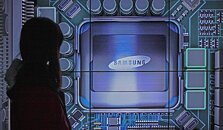- Joined
- Aug 19, 2017
- Messages
- 2,915 (1.05/day)
During its 55th annual shareholders' meeting, Samsung Electronics announced its entry into the AI processor market with the upcoming launch of its Mach-1 AI accelerator chips in early 2025. The South Korean tech giant revealed its plans to compete with established players like NVIDIA in the rapidly growing AI hardware sector. The Mach-1 generation of chips is an application-specific integrated circuit (ASIC) design equipped with LPDDR memory that is envisioned to excel in edge computing applications. While Samsung does not aim to directly rival NVIDIA's ultra-high-end AI solutions like the H100, B100, or B200, the company's strategy focuses on carving out a niche in the market by offering unique features and performance enhancements at the edge, where low power and efficient computing is what matters the most.
According to SeDaily, the Mach-1 chips boast a groundbreaking feature that significantly reduces memory bandwidth requirements for inference to approximately 0.125x compared to existing designs, which is an 87.5% reduction. This innovation could give Samsung a competitive edge in terms of efficiency and cost-effectiveness. As the demand for AI-powered devices and services continues to soar, Samsung's foray into the AI chip market is expected to intensify competition and drive innovation in the industry. While NVIDIA currently holds a dominant position, Samsung's cutting-edge technology and access to advanced semiconductor manufacturing nodes could make it a formidable contender. The Mach-1 has been field-verified on an FPGA, while the final design is currently going through a physical design for SoC, which includes placement, routing, and other layout optimizations.

View at TechPowerUp Main Site | Source
According to SeDaily, the Mach-1 chips boast a groundbreaking feature that significantly reduces memory bandwidth requirements for inference to approximately 0.125x compared to existing designs, which is an 87.5% reduction. This innovation could give Samsung a competitive edge in terms of efficiency and cost-effectiveness. As the demand for AI-powered devices and services continues to soar, Samsung's foray into the AI chip market is expected to intensify competition and drive innovation in the industry. While NVIDIA currently holds a dominant position, Samsung's cutting-edge technology and access to advanced semiconductor manufacturing nodes could make it a formidable contender. The Mach-1 has been field-verified on an FPGA, while the final design is currently going through a physical design for SoC, which includes placement, routing, and other layout optimizations.

View at TechPowerUp Main Site | Source


